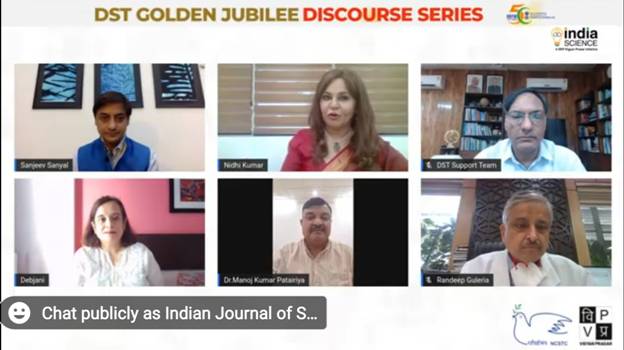Dignitaries deliberate on ‘The Other Side of the Pandemic’ as part of DST Golden Jubilee Discourse series
New Delhi: Dignitaries discussed the challenges and opportunities that the COVID 19 pandemic brought out at an online panel discussion on ‘The Other Side of the Pandemic’ organized as part of the DST Golden Jubilee Discourse series commemorating 50 years of DST.
“This theme has two different sides. The compelling lessons that we learn from this pandemic and how to translate them into practice of doing Science, Technology, and innovation is one, and the other is the challenges and new opportunities. The other side of pandemic could refer to the opportunities that we wish to explore together, and we have to keep leveraging these opportunities”, Secretary Department of Science and Technology, Professor Ashutosh Sharma explained.
The online panel discussion was organized jointly by the National Council for Science and Technology Communication, Department of Science and Technology (DST), Government of India, and Vigyan Prasar, recently.
“One of the key learnings from the COVID 19 pandemic in the past four months has been that while in the initial days of the pandemic everything starting from N-95 masks to PPEs, ventilators and so on was imported, within three months we were able to make our own world-class ventilators. The reason behind this has been a clear purpose and vision. Ownership on the part of a large chain of stakeholders starting from Academia to the Industry and with the support and flexibility from the government made this possible which otherwise could have taken years to achieve,” Prof. Sharma added.
Prof. Ashutosh Sharma mentioned that by taking care of every aspect of the innovation ecosystem essentially in the last 5 years, DST, which is celebrating its 50th years, has created more opportunities, more incubators, and more startups than in the last 50 years.
Prof. Sharma also mentioned that DST is the only government organization which is not focused narrowly on a sector or a set of labs and has a very diverse stakeholder base ranging from farmers, women living in small towns to top scientists, school students to Ph.D. students, and covers every possible area of science from the Atom to Astrophysics and everything in between.”
Shri Sanjeev Sanyal, Principal Economic Adviser in the Ministry of Finance, said that in the post-COVID world while talking about rebuilding, we have to keep in mind that we are not returning to the pre-COVID world. “Many things will change as a result of the COVID shock. There will be changes in geopolitics, supply chain, technology, and consumer behavior, and we have to think of new ways, new policies, incentivize our scientists to take their technologies to the market, make our technologists risk takers to lead into spin-offs,” he pointed out.
Dr. Randeep Guleria, Director of the All India Institute of Medical Sciences(AIIMS), advocated for making the public health care system more resilient and making sure that it can live up to the challenges of any large outbreak and epidemic in the coming years as learning from the COVID pandemic. He stressed on focusing on preventive healthcare and said that by using a mask and observing hand hygiene, we can reduce not only COVID but a number of respiratory diseases.
Ms. Debjani Ghosh, President, NASSCOM, mentioned that this has been a once in a 100-year opportunity for the IT industry to completely re-invent itself. She said, “It is going to be a hyper-digital and contactless world post-COVID, and in such a world the four main building blocks that will define the success of an industry would be trust, talent, innovation, and agility and for all this, we need to focus our attention on innovation as innovation is going to define India’s future.”

